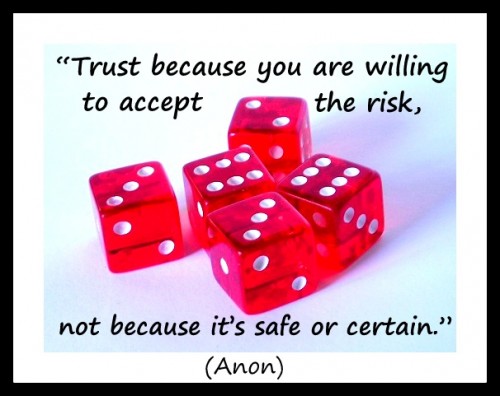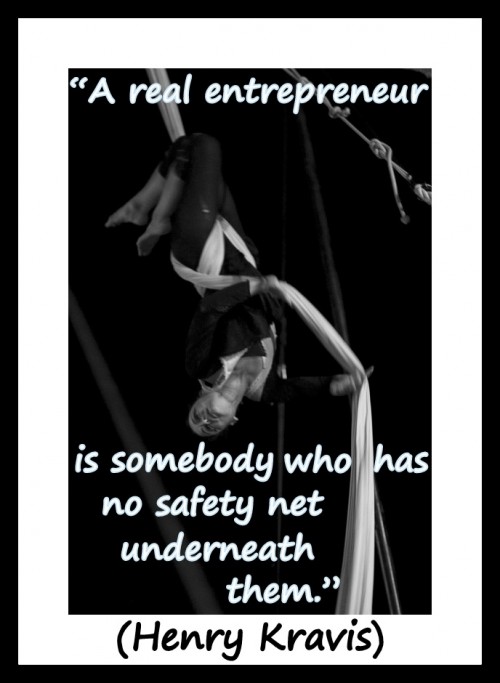Coaching Quote of the Day 15th July 2015

“Who bravely dares must sometimes risk a fall.”
(Tobias Smollett)

“Who bravely dares must sometimes risk a fall.”
(Tobias Smollett)

“Change and growth take place when a person has risked himself and dares to become involved with experimenting with his own life.”
(Herbert Otto)

“If you want to go on the sea without any risk of capsizing, don’t buy a boat: buy an island!”
(Marcel Pagnol)

“Trust because you are willing to accept the risk, not because it’s safe or certain.”
(Anon)
Do you agree with this quote?

“A real entrepeneur is somebody who has no safety net underneath them.”
(Henry Kravis)
Do you agree?
Feel free to comment below

“If you are not willing to risk the usual you will have to settle for the ordinary.”
(Jim Rohn)

“Only those that risk going too far can possibly find out how far one can go.”
(T. S. Eliot, writer)
In this week’s guest post Dave Doran discusses some potential risks he sees in running a coaching business.
by Dave Doran
Recently there has been much debate about the licensing and regulation of Coaching, bringing it into line with similar health-care professions such as Counselling and Psychotherapy. Although there is some regulation of coaching within sport, many coaches working within the business and lifestyle sectors do so without regulation. As a result the majority of coaching literature, especially within coach education, is focused on coaching models and processes, with minimal information about the risks to coaches operating in an unregulated environment.
This, in my opinion, has created a coaching culture where certain coaches operate businesses unaware of the risks created by legislation outside of coaching. But whilst the “regulation of Coaching” debate continues there are still areas where coaches can raise their awareness and minimise the risks to their business. These can be considered as;
This is one of the most important areas of coaching. A coaching contract should not only set out the legal and financial elements of the coaching relationship but define the professional and psychological boundaries under which the coaching will take place. Some important issues to consider are;
The premise that everything in the coaching relationship is confidential is untrue. There are certain occasions when a court could order a coach to disclose information about a coaching relationship. Additionally there is a legal basis where coaches would have a duty to disclose information received in a coaching relationship. This includes information about;
A civil court could also ask for client notes where a client was seeking damages against a coach for malpractice; occurrences of which are now happening in the USA.
These instances highlight the need for coaches to look at what notes they are keeping of coaching interactions, what they are recording and how the data is being stored and protected.
Another key subject for discussion, but in essence there are two clear areas for deliberation. Firstly does the coach/coaching business have a clear and published Code of Conduct? Secondly, are the ethical boundaries under which the coach/coaching business operates clearly defined?
There are numerous Coaching Associations who have produced Codes of Conduct which cover many of the ethical issues encountered in coaching. Having membership of a reputable Coaching Association and a coaching practice operating within agreed published Codes of Conducts greatly reduce the risks to a business.
What constitutes CPD in an unregulated industry? Again this is a dialogue that has been under discussion for some time, only recently receiving attention within coaching literature. How do Coaches know what is relevant to the development of their business or profession? And how would that development/learning stand up if challenged?
The Health Professions Council, who are in the process of regulating Counsellors and Psychotherapists, provide guidance on standards for CPD. These include;
These are just some of the issues facing Coaches and their businesses in terms of risk management. There are other areas such as Supervision and Coach Education which have not been covered, but can be considered to be of equal importance.
Although Coaching as an industry continues to operate in an unregulated environment there is still legislation in existence that creates inherent risks to the Coaching Industry and more work needs to be done to raise awareness in this area. Ultimately coaches not only have a duty of care towards their clients but one which protects themselves and their business.
Hopefully this article has raised more questions than provided answers. So what are your views about Coaching in an unregulated industry?
The legislation referred to in this article is legislation within the United Kingdom. Readers from areas outside of the UK should check with the legislation of the country in which they are coaching
Dave has been involved in the Coaching industry for over 25 years. After gaining a Masters Degree in Coaching, at Brunel University, he spent two years lecturing on ethical issues and risk management for coaches within sport.
Dave now runs his own Performance Coaching Company S4P Coaching Ltd. www.s4pcoaching.com and writes a regular blog about issues around Coaching and Performance at www.s4pblog.com
If you want to speak further contact Dave through the blog or website or at in**@s4*********.com